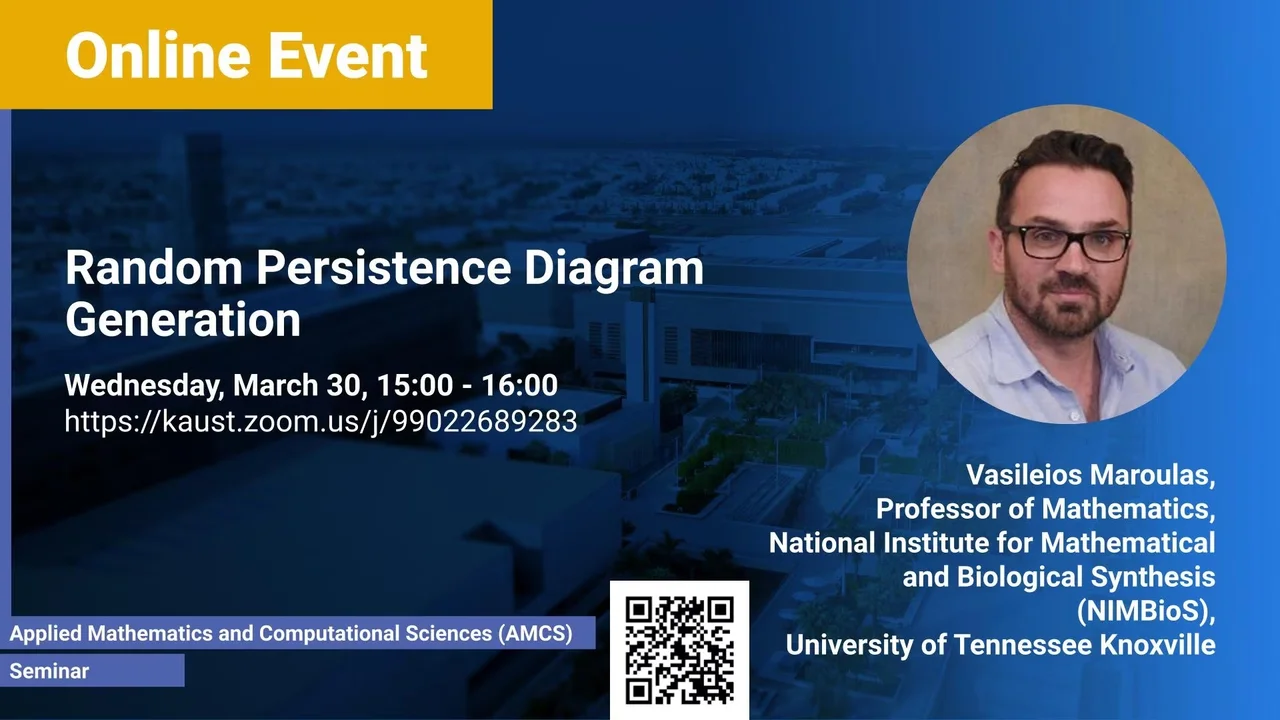
Random Persistence Diagram Generation
- Prof. Vasileios Maroulas, Director of AI and Data Science at the National Institute for Mathematical and Biological Synthesis (NIMBioS), University of Tennessee Knoxville.
KAUST
Topological data analysis (TDA) studies the shape patterns of data. Persistent homology (PH) is a widely used method in TDA that summarizes homological features of data at multiple scales and stores them in persistence diagrams (PDs). In this talk we will discuss a random persistence diagram generation (RPDG) method that generates a sequence of random PDs from the ones produced by the data. RPDG is underpinned by (i) a model based on pairwise interacting point processes for inference of persistence diagrams, and (ii) by a reversible jump Markov chain Monte Carlo (RJ-MCMC) algorithm for generating samples of PDs. An example on a materials science problem will demonstrate the applicability of the RPDG method.
Overview
Abstract
Topological data analysis (TDA) studies the shape patterns of data. Persistent homology (PH) is a widely used method in TDA that summarizes homological features of data at multiple scales and stores them in persistence diagrams (PDs). In this talk we will discuss a random persistence diagram generation (RPDG) method that generates a sequence of random PDs from the ones produced by the data. RPDG is underpinned by (i) a model based on pairwise interacting point processes for inference of persistence diagrams, and (ii) by a reversible jump Markov chain Monte Carlo (RJ-MCMC) algorithm for generating samples of PDs. An example on a materials science problem will demonstrate the applicability of the RPDG method.
Brief Biography
Dr. Vasileios Maroulas is a Professor of Mathematics and the Director of AI and Data Science at the National Institute for Mathematical and Biological Synthesis (NIMBioS) at the University of Tennessee Knoxville (UTK). He also holds adjunct appointments at the Business Analytics and Statistics at the Haslam College of Business, and the Bredesen Center’s Data Science Engineering at UTK. He is an Elected Member of the International Statistical Institute, an Editor-in-Chief of AIMS Foundations of Data Science, and an Associate Editor of Springer Statistics and Computing. He served as a Senior Research Fellow at the US Army Research Lab during 2019-2021. Following his PhD graduation from the Statistics Department at the University of North Carolina at Chapel Hill in 2008, he continued as a Lockheed Martin Postdoctoral Fellow at the Institute for Mathematics and its Applications (IMA) at the University of Minnesota for two years until he joined UTK in 2010. Maroulas was also a Mathematical Sciences Leverhulme Trust Fellow at the University of Bath, UK during 2013-2014. His research interests span from computational statistics and machine learning to applied probability and computational topology and geometry with applications in data analysis and quantum computing. His methods have found applications in chemistry, neuroscience, materials science, and biology. His work has been funded by several federal agencies, including AFOSR, ARO, DOE, and NSF; by national labs and private foundations, including ARL, ORNL, the Simons Foundation, and the Leverhulme Trust in the UK; as well as by industry, including Eastman, and Thor Industries.